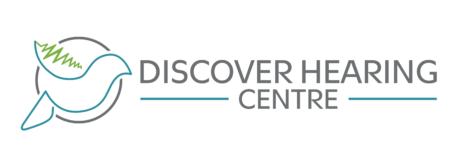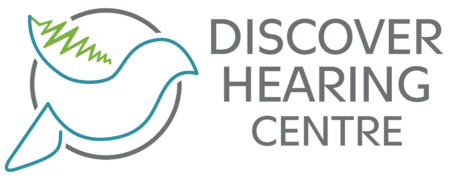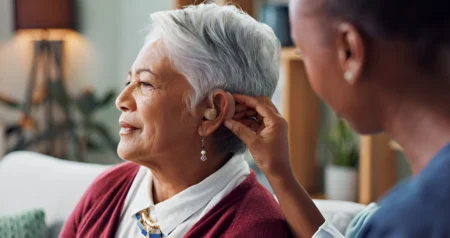Assistive Listening Devices: Beyond Hearing Aids

Living with hearing loss can be frustrating, even for those who use hearing aids. While hearing aids do a great job of amplifying sounds, they aren’t always enough in every situation. Whether it’s the noise in a busy restaurant or trying to follow a conversation in a large, crowded room, hearing aids can sometimes fall short. In fact, many individuals with hearing aids still face challenges in certain environments where sound clarity is compromised.
This is where Assistive Listening Devices (ALDs) come into play. ALDs are designed to provide an extra boost in challenging listening environments, working either alongside hearing aids or as standalone solutions. These devices enhance sound clarity, making it easier to hear in noisy spaces, at a distance, or when multiple speakers are involved.
In this blog, we’ll look closer at the various types of ALDs available and how they can improve your overall hearing experience.
Understanding the Limitations of Hearing Aids
Hearing aids are incredibly helpful, and whilst the technology is rapidly improving year after year, they do have their limits. In settings like a loud restaurant or a large conference hall, background noise can overwhelm the sounds you’re trying to focus on. Similarly, if the sound source is far away, such as a presenter in a large room, hearing aids might not provide enough amplification.
That’s where assistive hearing technology can really make a difference. ALDs help by boosting specific sounds, cutting through background noise, and delivering clearer audio directly to your ears. They’re particularly useful in environments where hearing aids alone might not be sufficient.
Types of Assistive Listening Devices
There are several types of assistive listening devices designed for different needs and environments. Let’s explore five of the most commonly used devices.
FM Systems (Frequency Modulation Systems)
FM systems use radio signals to transmit sound from a speaker directly to a listener. These systems are widely used in schools, conference rooms, and public spaces. FM systems improve sound clarity by sending audio directly to your ear, bypassing much of the background noise. This makes them especially useful in environments where distance or competing sounds make hearing difficult.
FM systems are great for educational settings, meetings, and large group events where it’s important to hear clearly, even from a distance. FM systems can be integrated with hearing aids to ensure you hear both environmental sounds and the transmitted audio, creating a more comprehensive hearing experience.
Infrared Systems
Infrared (IR) systems use light waves to send sound from a source to a receiver. Unlike FM systems, they rely on a clear line of sight between the transmitter and the listener. These systems are ideal for theatres, movie watching, or other scenarios where you’re stationary and can maintain a clear line of sight to the transmitter.
On the plus side, infrared systems don’t experience radio frequency interference, so you get a clear, uninterrupted signal. However, their limited range and the need for a direct line of sight can make them less convenient for more dynamic settings.
Induction Loop Systems (Hearing Loops)
Induction loops, or hearing loops, use electromagnetic fields to transmit sound directly to your hearing aid or cochlear implant if it has a telecoil (T-coil) setting. The loop system broadcasts sound wirelessly to your hearing aid, eliminating the need for extra devices or receivers.
Hearing loops are installed in churches, airports, theatres, and conference halls to provide better sound access for those with hearing loss.
Amplified Phones
Amplified phones are designed to make phone conversations clearer and louder for individuals with hearing loss. They come with features like adjustable volume control and clearer sound transmission.
You can increase the volume to suit your needs, and many models offer compatibility with hearing aids, ensuring a more comfortable conversation experience. These phones are perfect for home use, offices, or seniors who have difficulty hearing on traditional phones.
Personal Sound Amplifiers
Personal sound amplifiers boost ambient sound to help users hear more clearly. They’re not classified as medical devices like hearing aids, but they can be helpful for people with mild hearing loss or those needing occasional hearing support.
These amplifiers work well in situations like birdwatching, lectures, or casual conversations where you just need a little extra sound enhancement. Unlike hearing aids, personal sound amplifiers are not tailored to your specific hearing loss and are intended for temporary or occasional use.
Benefits of Using Assistive Listening Devices
Using ALDs can significantly enhance your hearing experience, offering several key benefits:
- Better Sound Clarity: ALDs help to isolate and amplify important sounds, making conversations or presentations easier to follow.
- Improved Communication: Whether you’re in a noisy room or a large space, ALDs help ensure clearer conversations and fewer misunderstandings.
- Personalized Settings: Many ALDs allow you to adjust settings to suit your specific hearing needs, whether in a quiet or noisy environment.
- Increased Confidence and Independence: Being able to hear more clearly in challenging environments can boost your confidence and help you stay more engaged in conversations and social activities.
How to Choose the Right Assistive Listening Device
Selecting the right ALD can depend on several factors:
- Assessing Your Needs: Consider where you most need hearing support—at work, at home, or in public spaces—and the degree of your hearing loss.
- Consulting a Hearing Specialist: Getting professional advice from a hearing specialist can help ensure you choose the best device for your needs, whether it’s an FM system, hearing loop, or personal sound amplifier.
- Budget Considerations: Some ALDs may be covered by insurance or hearing health programs, so it’s essential to consider the cost and availability of different devices.
Boost Your Hearing with ALDs from Discovery Hearing Centre
Assistive Listening Devices (ALDs) offer a wide range of solutions to help individuals with hearing loss hear more clearly in various environments. From FM systems and infrared devices to personal sound amplifiers, these tools can significantly enhance communication and improve quality of life.
If you’re interested in learning more about ALDs or need guidance on selecting the best option for your needs, contact Discover Hearing Centre at our hearing clinic in Kitchener. We offer hearing tests, hearing aids, and expert advice on hearing loss solutions. Don’t settle for struggling to hear—explore how ALDs can help improve your everyday interactions.
We offer comprehensive audiology services, from hearing tests and education to digital hearing aids and personalized hearing loss treatments that put you and your specific hearing health needs at the centre. Whether you need a hearing test, are looking for hearing aid repairs, hearing aid batteries, invisible hearing aids, custom-moulded earplugs, or require help with hearing aid fittings and programming, Discover Hearing Centre is here for you.
Discover Hearing Centre is a local clinic specializing in the treatment of hearing loss; we’ve worked with hundreds of patients to help them maintain independence. Whether you’re experiencing hearing loss or tinnitus, we’re dedicated to improving your quality of life through better hearing. When you choose us, you choose a team committed to your well-being.
Call us today at 519-208-4327 or fill out our convenient online form to learn more about how we can help you with hearing loss issues.
You Might Also Like
Top 4 Major Causes of Hearing Loss
What Is Tinnitus? Causes, Symptoms, and Treatment Options
Does Tinnitus Get Worse With Age?
Have Questions?
Call our office if you have any questions about your hearing loss or anything else related to hearing. We are happy to help and answer any questions you may have.





